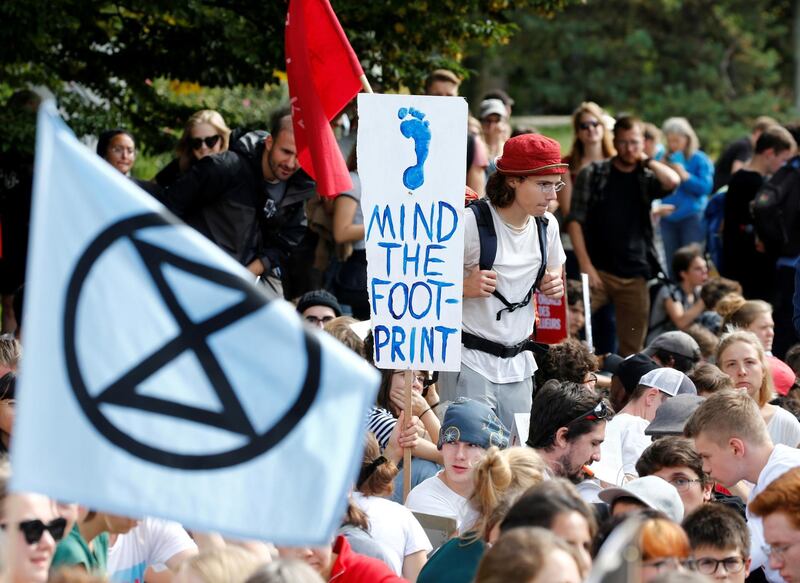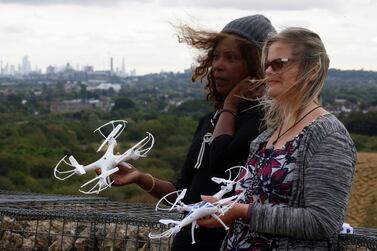For centuries, Smithfield Market has been at the centre of London’s meat trade and its own history shows how times change. Many years ago it served as a site of public execution, with the Scottish Independence hero William Wallace among those hanged for treason in the area.
In early October, climate activists will attempt to give history another nudge by blockading the market, hoping to shut it down, ultimately for good.
“Our essential position is that we’re currently in a climate emergency, an ecological emergency and the solution to that crisis is to transition to a plant-based food system,” said Dan Kidby, a co-founder of the Animal Rebellion group.
Science, he says, shows that the way humans consume animal products and the agricultural systems they use to support the industry, makes it abundantly clear that a societal shift towards veganism is the only path forward.
It’s a “no-brainer” given the “utter catastrophe that’s coming,” says Mr Kidby.
He joins a fast-growing collective, including Extinction Rebellion and Heathrow Pause, demanding a fundamental shift in the way human beings understand their role in climate change.
‘We see ourselves as coming into an already powerful and existing movement. We’re joining and working in solidarity with other social movements that’s coming together in an alliance to demand a system of change from the British government.”
Dr Joseph Poore, a researcher as Oxford University, believes going vegan is the “most powerful change that most people can make to their lives to reduce their environmental impact.”
“Historically land use, the clearing of all this land, which was forest, which was natural grasslands, to convert it into cropland, that’s historically been a very big driver global warming,” he said recently in conversation with activist Genesis Butler.
Animal Rebellion, which says it is expecting thousands to support its move, wants to blockade Smithfield Market for as long as two weeks.
As morning commuters arrive at the edge of London’s financial district for work, the Smithfield traders' shifts, which began just after midnight, draw to a close. Even at the market a hint of sympathy can be found for the protests.
“To be honest, I think it’s over the top but I respect their views in terms of not eating meat but everyone’s got a choice in life. I mean you eat meat, you don’t go and knock on the vegan’s window and say ‘look I eat meat, you should start eating meat,” said Sam Smith of wholesaler James Burden.
“I understand the world’s changing. My whole family are vegetarian so I understand both sides of it. But I think it’s very extreme to do what they’re (the protesters) doing,” he added, explaining that the company had contingency plans if the blockade went ahead.
A passing colleague joked “come here at your own risk,” referring to the protesters. The unnamed man explained any anger towards the activists was less likely to come from the sellers and more from local business and restaurant owners who rely on Smithfield for produce.
“If there’s any trouble it’ll come from outside, it won’t be from the market itself,” the man said, claiming in particularly that fast food outlets in the surrounding areas, particularly Turkish origin owners of Kebab shops feared disruption to their businesses.
“They’re a little bit more angrier than us, put it that way,” added Mr Smith.
“[It’s] affecting their businesses, we’re only providing a service but at the same time it’s going to affect both of us.
“We just have to see both sides of it and respect it. But yeah, it’s not going to us any favours,” said Mr Smith.
Another butcher from a different stall deemed the protest “a waste of time” that would probably only last a few days.
But Animal Rebellion makes no compromise on its vegan agenda and is determined to follow through, even if they risk arrest. They don’t support the notion of just cutting down on meat consumption and instead back an entirely plant-based diet entirely to underline the severity of the climate crisis.
“We need to absolutely transition as soon as possible. We’re pushing forward to do that by 2025 just to, you know, forestall a catastrophe that’s coming,” Mr Kidby says.
But they have a dual approach that encourages a sustainable approach to growing food too.
“We can do it in a way which is healthy and is about regenerating soil and it’s about creating good healthy food to feed people and nourish people. And that’s what we’re advocating. We’re advocating the most environmentally, just option possible,” he added.
It’s unclear exactly how many people will join the blockade of Smithfield Market, although organisers have said they expect a few thousand. Mr Kidby predicts many will be arrested but says it is an experience he doesn’t want or cherish. Supporters are prepared for the “sacrifice” and “risk,” such is the current catastrophe and animal suffering they see unfolding he says.
A recent attempt by protesters to stop flights at Heathrow Airport was disrupted by multiple arrests the day before.
The Vegan Society, citing surveys including those by the Food Standard Agency, says the number of vegans in the UK quadrupled between 2014 to 2018 to 600,000 or 1.16 of the population.
“Through reading more about factory farming and the way the animals are treated, it became much more of an ethical factor. Then it became about the environmental issues i.e deforestation, methane, acid rain, land and water degradation,” said Mary Pattisson, a 24-year-old filmmaker from London.
“I think the world needs more sustainable farming, not necessarily more vegans. People generally should cut down on the meat they consume and make sure what they are eating is sourced from ethically sound and viable places,” she said.
Sam Scott, a 25-year-old from Reading, poses a broader question of where moral obligation comes from adding that individuals must weight the impact of their lifestyle.
“And honestly I don't really think either side is right or wrong but the side you come down on determines whether or not veganism matters,” he said.







